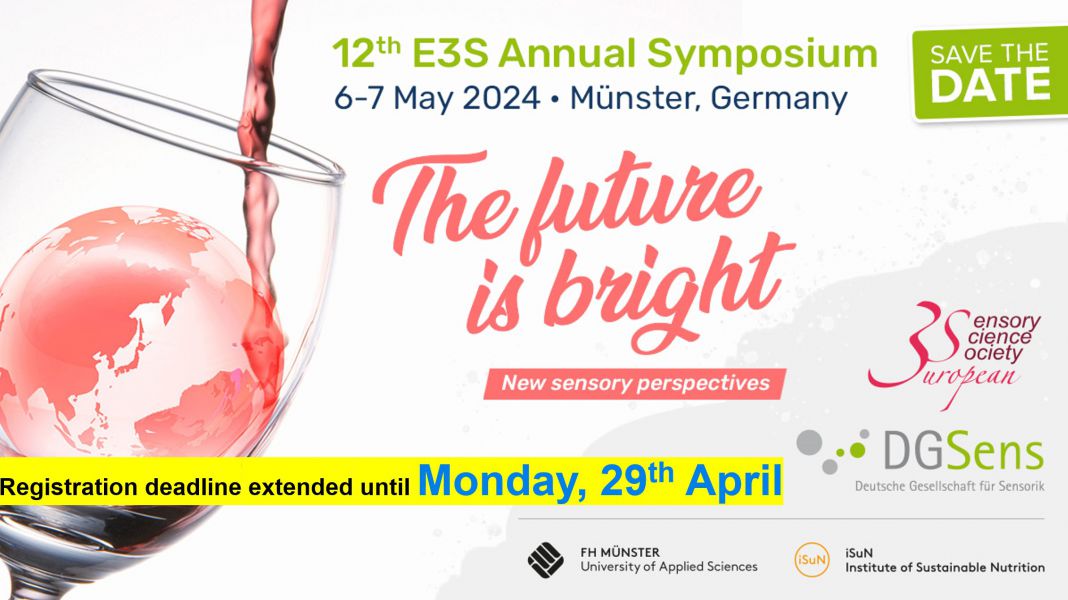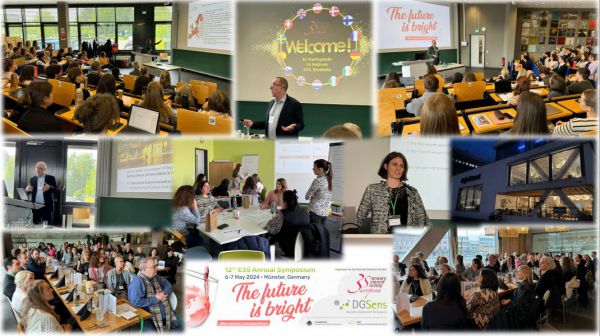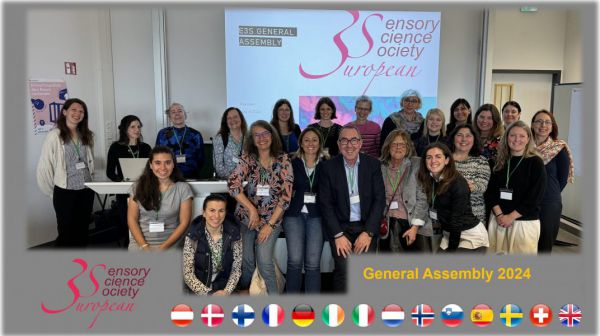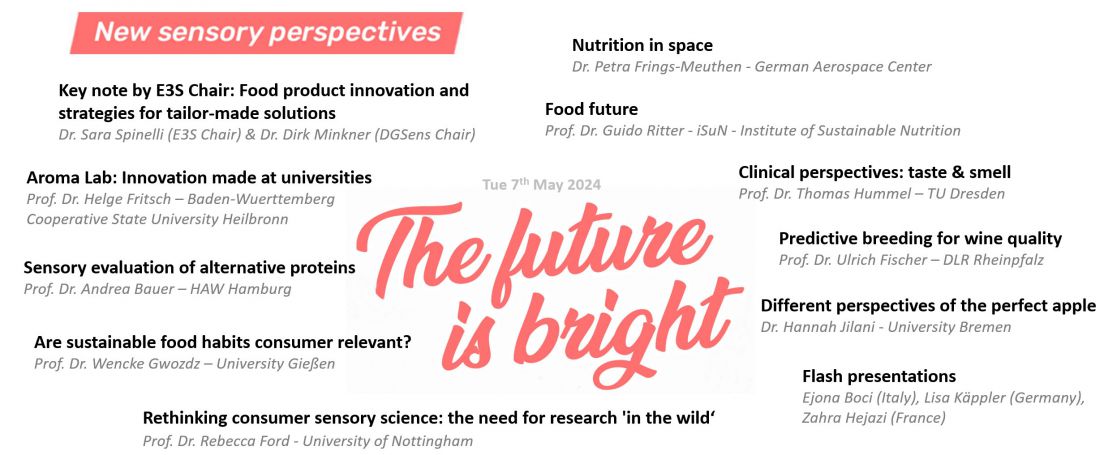E3S Annual Symposium 2024
The future is bright – New sensory perspectives
The German Sensory Society is delighted to host the 12th E3S Annual Symposium Tue 7th May 2024 at the University of Applied Sciences in Münster / Germany.
Transformation of our global food system is necessary and has just begun. There are a lot of challenges and tasks for researchers in nutrition science and product development. Sensory sciences can make a positive contribution to tasteful and sustainable future food for good living. Among other topics the symposium includes talks related to the deep understanding of our human perception, the taste of biodiversity in wine breeding and our learnings from space nutrition. … for good food and a bright future.
The one-day symposium on Tue 7th May also provides excellent international networking opportunities for all attendees and is highly relevant to researchers, students, and professionals interested in the latest developments in sensory science.
The European Sensory Science Society General Assembly, which is a closed meeting for E3S members, will take place on Mon 6th May along with meetings of the working groups associated with ES3.

______________________________________________________________
Successful Event...

What a day!.....we just finished the E3S symposium in Münster....82 participants from 14 countries....2 days full of sensory science.....14 inspiring presentations, 3 exciting workshops, 3 great working group meetings, lots of energy, excellent discussions and outstanding networking.....thanks to all participating & contributing and making it such a successfull event!
______________________________________________________________
E3S General Assembly 2024

Participants from 14 countries joining the E3S general assembly 2024 to actively shape the future of sensory science in Europe.....
______________________________________________________________
Presentations and Pictures
Please note: Selected presentations and pictures will be available end of May!
Registered participants will get access to download a selection of presentations and pictures by end of May. You will receive an email with more details then....
______________________________________________________________
Programme Overview Tuesday 7th May

8:30 – 16:45 Symposium with invited speakers from industry and academia
Tuesday 7th May 2024
8:30 – 16:45 Symposium with invited speakers from industry and academia
Schedule
08:30 Registration & Refreshments
___________________________________
09:15 Welcome & Key note by E3S Chair: Food product innovation and strategies for tailor-made solutions (Dr. Sara Spinelli (E3S Chair) & Dr. Dirk Minkner (DGSens Chair)
___________________________________
09:45 Food future (Prof. Dr. Guido Ritter - iSuN - Institute of Sustainable Nutrition)
The sustainability of future food systems can be improved by many ways. What are the challenges for food product development? How can sensory and consumer research contribute to the sustainability of a future food system?
___________________________________
10:15 Nutrition in space (Dr. Petra Frings Meuthen - German Aerospace Center, Institute of Aerospace Medicine - DLR)
Numerous astronauts have participated in space missions, spending periods of up to 15 months on both the MIR and International Space Station (ISS). Health monitoring indicates that these astronauts typically consume only about 80% of the recommended daily calorie and nutrient intake. Such deficiencies raise concerns regarding potential negative impacts on astronauts' mental and physical health during upcoming interplanetary journeys, which are expected to last about three years. Among the various theories addressing this calorie gap, alterations in the smell and taste of meals might affect food intake. Ensuring the fitness of astronauts while minimizing energy usage is crucial for exploration missions. However, this objective presents challenges, especially considering the weight constraints associated with transporting food via rockets.
___________________________________
10:45 Are sustainable food habits consumer relevant? (Prof. Dr. Wencke Gwozdz – University Gießen)
Which dietary behaviours have the potential to promote sustainable food systems? Do these behaviours have a high behaviour change potential? Which barriers do consumers face and what are potential leverage points to overcome those?
___________________________________
11:15 Aroma Lab: Innovation made at universities (Prof. Dr. Helge Fritsch – Baden-Wuerttemberg Cooperative State University Heilbronn)
Sensory offers more than just guidance for product development and definition in an analytical role: As a source of inspiration, it has a high potential in the product innovation process. Using the example of the stimuli area of aroma perception, it is shown how aroma science and innovation workshops can be linked specifically for food innovation design. Concrete case studies from innovation workshops already held at the Baden-Wuerttemberg Cooperative State University Heilbronn with food management students, as company representatives from the entire food value chain, demonstrate the approach described – engaging the senses.
___________________________________
11:45 Rethinking consumer sensory science: the need for research 'in the wild' (Prof. Dr. Rebecca Ford - University of Nottingham
This talk will explore the limitations of traditional sensory consumer research methods by presenting the gap between controlled environments and real-world consumer experiences. The needs for more ecologically valid research methodologies that benefit from enhanced external validity will be discussed as well as the methodological considerations and ethical challenges for conducting research in the wild. The importance of interdisciplinary collaboration and integration of new technologies will be presented using the University of Nottingham’s living lab – Connect Nottingham as an example.
___________________________________
12:15 Lunch & Poster Session
___________________________________
13:15 Clinical perspectives: taste & smell (Prof. Dr. Thomas Hummel – TU Dresden)
The sense of smell is important! The lecture will show how olfactory disorders affect people, what types of olfactory disorders there are, and also touch upon aspects of how olfactory disorders can be diagnosed and treated.
___________________________________
14:00 Flash presentationsby young researchers
- The Text Highlighting Method for measuring attitudes toward sustainability: advantages and limitations (Ejona Boci - Department of Agriculture, Food, Environment and Forestry (DAGRI), University of Florence)
- Oenological measures to improve sensory quality of dealcoholised white and red wines (Lisa Käppler - DLR Rheinpfalz, Neustadt an der Weinstraße/Germany)
- Sensory Nutrition: the Umami Taste Role in Satiation and Eating Behavior (Zahra HEJAZI - University of Burgundy Franche Comte, Dijon, France)
___________________________________
14:45 Coffee Break
___________________________________
15:15 Award Presentation - Student Competition
___________________________________
15:25 Predictive breeding for wine quality (Prof. Dr. Ulrich Fischer – DLR Rheinpfalz)
Breeding of new, fungi-tolerant grape varieties (PIWI), which will reduce pesticide treatment in integrated and organic viticulture by 80%, is still slowed down by the long time needed to obtain enough grapes for winemaking and quality evaluation. To speed up this process, a consortium of geneticist, breeder, analyst and sensory scientist joined to develop genetic marker in the grape vine genome. Genetic markers are already widely used to detect at an early stage presence of fungus resistances in a new breeding. Sensory evaluation of wines made from grapes of 150 crossings of the same two parents were done during 6 vintages and yielded a stable differentiation between good and poor quality crossings. Relating the sensory quality traits with a large and precise genetic map allowed to identify several quality markers related to biosynthesis of aroma compounds and the grape ripening process. These markers will allow now to discard at a very early stage the selection of crossing of promising wine quality from those breeding’s, which can be safely discarded due to a poor quality potential. Preference for PIWI wines have been assessed in home-use-tests by German, Danish, Dutch, French and Italian consumers and showed equal or even improved quality than the benchmarks of traditional grape varieties.
___________________________________
15:55 Sensory evaluation of alternative proteins (Prof. Dr. Andrea Bauer – HAW Hamburg)
Considering the rapid growth of the global population, and challenges regarding the sustainability of animal-derived proteins, proteins from alternative sources like plants and insects are enjoying increasing interest for food and feed production. Many alternative protein ingredients already are commercially available. However, their techno-functional and sensory properties are not fully known. This makes choosing the “right” protein difficult for product developers. Therefore, a research consortium embarked on evaluating the characteristics of protein ingredients from various sources, aiming at building a protein-database for the targeted selection of protein ingredients in the product development process. HAW Hamburg examined the sensory properties of 59 protein ingredients from 13 different sources in aqueous dispersion, and in emulsion, applying the Rate-All-That-Apply (RATA)-methodology. This presentation will provide insights into the research project and share some results.
___________________________________
16:25 Different perspectives of the perfect apple (Dr. Hannah Jilani - University Bremen)
Different perspectives of consumer perception - Results from a national survey
Todays consumers are used to buy perfect looking fruits and vegetables from all over the world. But are they actually willing to buy less perfect looking products in order to prevent food waste? This choice-experiment investigated attributes (local and organic production, price, promotional claims) that may enhance the willingness of consumers to purchase 'imperfect' looking apples.
___________________________________
16:40 Closing Remarks
___________________________________
16:45 End of Symposium
______________________________________________________________
You can also download the whole E3S conference programme 6th/7th May here below. It contains all information, including schedule, floor plan, travel details etc. (Latest update 28th April 2024):
______________________________________________________________
The people behind...

In case of questions, please do not hesitate to contact the organizing committee: info@dgsens.de
_______________________________________________________________________
_____________________________________________________________
___________________________________________________
Last Update: 28. April 2024
